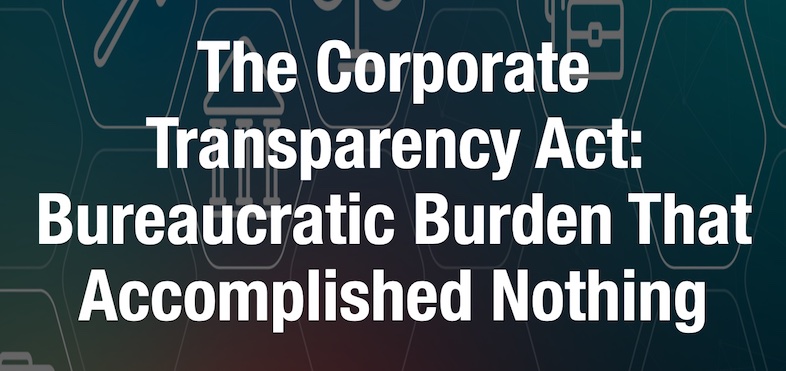
The Corporate Transparency Act: A Bureaucratic Burden That Accomplished Nothing
By Raymond Dickey – Wednesday, March 26, 2025
If you’re involved in community associations, you already know that regulations often create more problems than solutions. But few legislative efforts have been as pointless and frustrating as the Corporate Transparency Act (CTA).
When the CTA was enacted, it was framed as a critical tool to prevent money laundering and the financing of terrorism. That sounds noble in theory. In practice, it became a bureaucratic nightmare—one that did nothing to actually enhance financial oversight while placing unnecessary stress on volunteer board members.
Community associations were swept up in this misguided effort, despite the fact that anyone with even a rudimentary understanding of how associations function would know that the idea of HOAs laundering money for terrorists is ludicrous. As attorney David Byrne put it:
“It is really hard to conceive a way in which a community association could actually funnel $$ to terrorists or launder their money. Even if it is conceivable, having volunteer trustees—who usually cycle in and out of positions of influence and who rarely have unilateral, undisclosed control of a community’s funds—do the registration and not managing agents, who may have more uninterrupted and easy access to community association funds, isn’t even a good way to achieve the goals of the law”
In other words, if fraud were to occur, it wouldn’t be through an ever-changing group of volunteer board members—it would happen through management, financial officers, or external bad actors. Yet, the CTA targeted the wrong people, forcing HOA boards to scramble through compliance measures they neither needed nor were equipped to handle.
A Time-Sucking, Stress-Inducing Mess
For community associations, the CTA wasn’t just pointless—it was stressful. Many board members, who already juggle their unpaid roles with full-time jobs and personal obligations, were suddenly tasked with deciphering complex federal reporting requirements. The government provided little guidance, and legal experts were left trying to untangle whether associations even needed to comply in the first place.
And then, after months of wasted time and stress, FinCEN abruptly suspended the reporting requirement for U.S. companies. So what was the point of all this?
As I summed it up in an email to David Byrne:
“If I’m understanding this right, this whole thing just ended up being a total waste of time and money for everyone in our industry?”
David’s response? “Total insanity and a total waste.”
He’s right. What we saw with the CTA was the classic hallmark of government overreach—a regulation that solves no real problem while creating massive amounts of paperwork, confusion, and wasted effort.
What’s Next? More Bureaucracy?
One of the most frustrating aspects of this ordeal is that state legislatures are now considering their own versions of the CTA. If the federal version was bad, imagine 50 different interpretations of the same pointless law, each with its own reporting rules and compliance nightmares.
We saw this happen before with other overreaching regulations, and the result is always the same: volunteer boards and small organizations get buried in red tape, while the actual bad actors find new ways to exploit the system.
The Bottom Line
The Corporate Transparency Act was a failure—not just in execution, but in concept. It placed an unnecessary burden on volunteer board members, wasted countless hours of time, and achieved nothing meaningful in preventing financial crimes.
The fact that the law has now been suspended is proof that it was a misguided effort from the start. The unfortunate part? The stress and frustration it caused are not reversible.
As an industry, we need to push back against these kinds of misguided regulations before they become law. Otherwise, we’ll find ourselves stuck in another cycle of wasted time, unnecessary compliance, and government overreach—all for a problem that never existed in the first place.
Does not constitute legal or other professional advice. Consult your legal, accounting and other professionals to assess any situation before taking action.
Raymond Dickey is the publisher of AssociationHelpNow.com.
David Byrne is an attorney partner in the Community Association Department with Ansell Grimm & Aaron PC. He is licensed in New Jersey, New York and Pennsylvania.